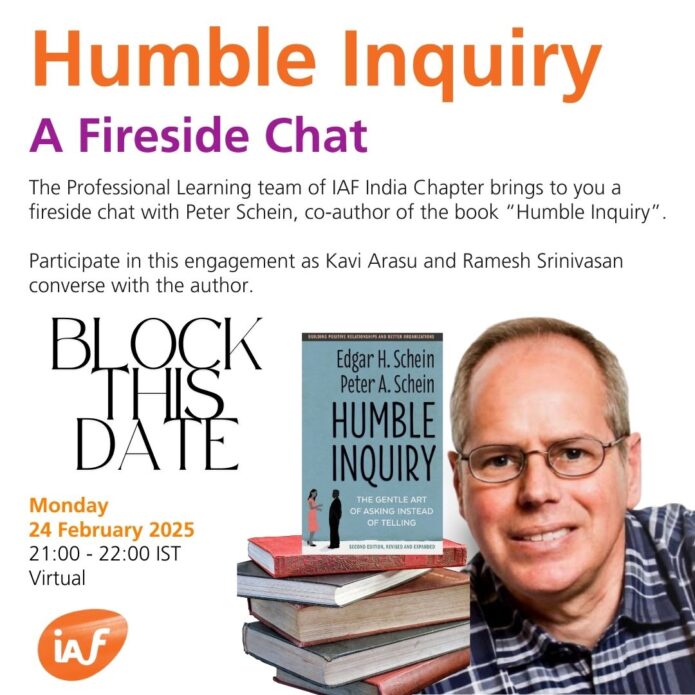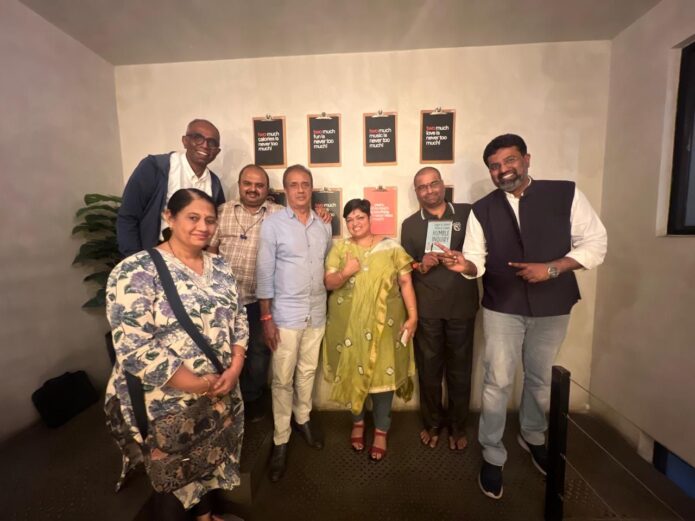Edgar Schein’s work has been a personal north star for me. His thoughts on leadership, culture, and learning have shaped my work in profound ways. When he passed away in 2023, it felt like a personal void. So, it was particularly special to speak with Peter Schein, who is carrying forward his father’s legacy with clarity and depth.
This obituary described Ed not just as a founding father of organisational development but as a loving father who found renewal through co-authoring books with Peter. On his last outing, Edgar had said, “We have a new style, new topics, new interests to write about, and so it is a whole new way of being, again…” This Dad-Son collaboration is refreshing and good.
In the run-up to this event, we had a chat with Peter. Beyond Humble Inquiry, we touched upon other works, including Career Anchors, which has had a refresh and additions. I have made a mental note to refresh my understanding of this. Much has changed, but the core ideas remain powerful. These conversations reminded me why Schein’s work continues to be so relevant in today’s shifting world of leadership and learning.
What also stood out was Peter’s own journey. Unlike his father, who was a social psychologist, Peter took a different path—studying anthropology at Stanford. He was drawn to understanding how groups function, how cultures evolve, and how behaviour shifts over time. It was an epiphany for him that his father’s work had also been about groups and culture, though approached from a different lens. And yet, despite this contrast, father and son found a way to collaborate seamlessly.
Even Edgar’s own intellectual journey was shaped by another discipline—his father was a physicist. This meant Edgar grew up acutely aware of the divide between the physical and social sciences. He knew that leadership, culture, and change couldn’t be measured with the same precision as the laws of physics. Perhaps that’s what made him so committed to inquiry—asking, not telling. Understanding, not prescribing.
This wasn’t just a learning moment—it was a reinforcement of ideas I have long believed in. And I wasn’t alone in the dialogue. Ramesh Srinivasan played a key role in setting up the conversation and posed thoughtful questions, while Sushma Banthia ensured seamless tech support and community engagement. Together, we created a space for deep exploration.
Key Reinforcements from the Conversation with Peter Schein
- Humble Inquiry is an Attitude, Not Just a SkillHumble Inquiry is about embracing what you don’t know. It’s not just a leadership technique—it’s a way of being. Real influence doesn’t come from authority but from drawing out the collective intelligence of a group.
- From Transactions to RelationshipsWork is no longer neatly separated from life. The idea of personizing—bringing one’s whole self into interactions—creates deeper trust. Organisations that innovate foster strong relationships, not just functional exchanges.
- Unlearning the Habit of TellingMany leaders struggle with the instinct to tell rather than ask. The ‘learning trios’ method—where one person asks, another responds, and a third observes—helps leaders practice listening and creating discovery rather than defaulting to pre-packaged answers.
Expanding on Three Key Ideas
1. Leadership Through Inquiry
Leadership today isn’t about having all the answers. It’s about knowing how to ask. True leadership is about enabling collective wisdom to surface. Leaders who practice inquiry build teams that are more engaged, self-sufficient, and innovative. Asking thoughtful questions—rather than giving quick answers—creates a culture where people take ownership of problem-solving rather than waiting for directives.
Peter reinforced that inquiry also makes decision-making stronger. When leaders create an open space for dialogue, they expose blind spots and identify nuances they wouldn’t have considered on their own. The most effective leaders are those who foster a culture of shared curiosity rather than just direction-setting.
2. The Digital Shift—Can Inquiry Survive?
Virtual workspaces present a challenge to humble inquiry. Emails and Slack messages strip away nonverbal cues, making it harder to sense curiosity, intent, or hesitation. Video calls are helpful, but they need to be designed for meaningful conversations, not just efficiency. Peter highlighted that sometimes, removing visual distractions—like during a phone call or a ‘walk and talk’—can actually enhance listening.
Another key challenge is the tendency to over-rely on efficiency tools at the cost of deep engagement. Organisations must be deliberate in creating time for structured dialogue. Inquiry can survive in digital spaces, but it requires conscious effort—leaders must model it, encourage it, and create safe spaces for open-ended discussions.
3. Silence as a Leadership Tool
One of the most underrated aspects of inquiry is knowing when to stay silent. Peter shared a story about a leader at an organisation he worked with, who wielded power not through commands, but through silence. Instead of rushing to offer solutions, he created space for people to think, reflect, and contribute. His presence alone shifted the room.
Silence is uncomfortable for many, but it can be a game-changer. Leaders who hold back and allow moments of quiet give others permission to step up. Silence also helps in difficult conversations—rather than filling the void with explanations or justifications, staying quiet can allow new perspectives to emerge.
Great facilitators and leaders use silence strategically, allowing the weight of a question to sink in before rushing to the next point. Inquiry is as much about listening as it is about asking the right questions.1. Leadership Through Inquiry
Inquiry and My Own Reflections
This conversation also led me to revisit some of my own writings on the subject. Over the years, I’ve explored the themes of inquiry, facilitation, and conversations through different lenses. In The Lost Art of Fine Conversations, I reflected on the power of dialogue and the unseen impact of simple exchanges. In Building an ‘an attitude of interes’- Humble Inquiry, I examined how Edgar Schein’s principles resonated with my experiences. And in Characteristics of Awesome Facilitators, I delved into what makes facilitation truly transformative. These themes continue to shape my thinking and reinforce the idea that learning is a lifelong journey.
Essential Truth
This conversation reaffirmed an essential truth: Humble Inquiry doesn’t make leaders passive. It makes them effective. The real test of leadership isn’t in confidence, but in knowing when to listen.
In an age of loud voices, true leadership may just be about asking better questions. Edgar Schein understood this deeply. And thanks to Peter, that legacy continues. And it’s a much needed legacy in the brusque times that we live in.
It was a fun evening with the members of the International Association of Facilitators and Peter. Thoughtful questions, engaged participation, and a shared curiosity made it memorable. If anything, it reinforced why inquiry—not assertion—is the foundation of real leadership.




















